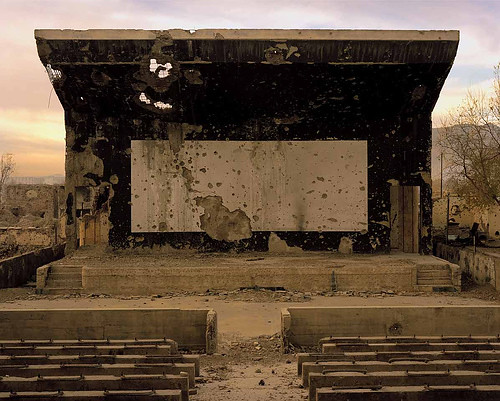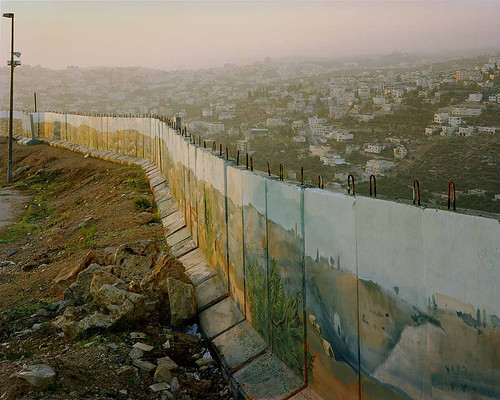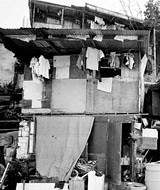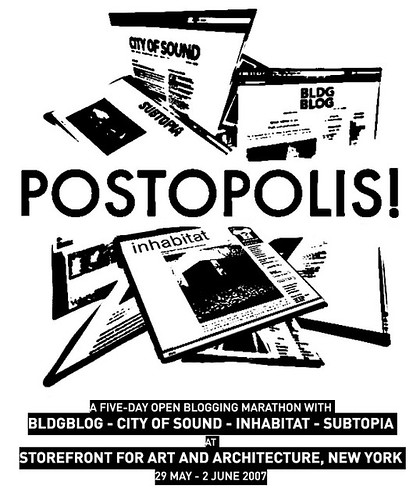A "Military Sublime"
In case you somehow missed it, or didn’t quite get to finish it the first time around and now simply want to pick up where you last left off, but had forgotten (and just need a little reminder!); or in case you even wanted to reread it a second and third time; or, maybe, you just want to look at the pictures (as unbelievable as they are); perhaps, you want to reference it, for an essay or some blog post of your own, or something. I must point out Geoff Manaugh’s latest and greatest interview with photographer Simon Norfolk, which is all too relevant to Subtopia, to say the very least.

[Image: Simon Norfolk. "Bullet-scarred outdoor cinema at the Palace of Culture in the Karte Char district of Kabul." From Afghanistan: Chronotopia.]
A photographer who has somewhat divorced himself from the maw of photojournalism, his work positions and processes itself more like a form of landscape art; stark and present when all else is absent, like some forlorn architectural memory that lingers in the course of an unnoticed but epic moment of terrestrial reflection. And to that effect, his photos cast a brilliant light not only on the way landscapes can be photographically rendered but more so on how the production of space itself can be unraveled in the context of militarism and warfare. That is to say, he is the photographer of a military urbanism, and his images capture more than just the remnants of war that litter the landscape post-conflict, but peer into the formulation of space itself where the military is but an ethereal colonizer of all we inhabit.
Geoff writes, “His photos reveal half-collapsed buildings, destroyed cinemas, and unpopulated urban ruins in diagonal shafts of morning sunlight – from Iraq to Rwanda, Bosnia to Afghanistan – before venturing further afield into more distant, and surprising, landscapes of modern warfare. These include the sterile, climate-controlled rooms of military command centers, and the gargantuan supercomputers that design and simulate nuclear warheads. [...] Indeed, he reminds us, 'anybody interested in the effects of war quickly becomes an expert in ruins.'"
Norfolk himself explains in an earlier written text called Et in Arcadia Ego: "These photographs form chapters in a larger project attempting to understand how war, and the need to fight war, has formed our world: how so many of the spaces we occupy; the technologies we use; and the ways we understand ourselves, are created by military conflict."

[Images: Simon Norfolk. "The illegal Jewish settlement of Gilo, a suburb of Jerusalem. To deter snipers from the adjacent Palestinian village of Beit Jala (seen in the distance) a wall has been erected. To brighten the view on the Israeli side, it has been painted with the view as it would be if there were no Palestinians and no Beit Jala."]
Uh, yeah. And the interview hasn't even begun, which, as you can imagine goes on to cover more than I can possibly state here, and thus I really have to resist re-posting the whole damn thing. So, do yourself a favor and go read it right now.
Otherwise, if you must follow along out of sheer dedication to Subtopia, my dear and devoted reader, Norfolk goes on to say:
“All of the work that I’ve been doing over the last five years is about warfare and the way war makes the world we live in. War shapes and designs our society. The landscapes that I look at are created by warfare and conflict.
I'm trying to stretch that idea of what a battlefield is. Because all the interesting money now – the new money, the exciting stuff – is about entirely new realms of warfare: inside cyberspace, inside parts of the electromagnetic spectrum: eavesdropping, intelligence, satellite warfare, imaging. This is where all the exciting stuff is going to happen in twenty years' time. So I wanted to stretch that idea of what a battleground could be. What is a landscape – a surface, an environment, a space – created by warfare?”
“It ends up being like a relationship with the sublime – a military sublime. All of the work I'm doing, I might even call it: "Toward a Military Sublime." Because these objects are beyond: they’re inscrutable, uncontrollable, beyond democracy.”
So, on that note – go check it out in full BLDGBLOG form.

[Image: Simon Norfolk. "Bullet-scarred outdoor cinema at the Palace of Culture in the Karte Char district of Kabul." From Afghanistan: Chronotopia.]
A photographer who has somewhat divorced himself from the maw of photojournalism, his work positions and processes itself more like a form of landscape art; stark and present when all else is absent, like some forlorn architectural memory that lingers in the course of an unnoticed but epic moment of terrestrial reflection. And to that effect, his photos cast a brilliant light not only on the way landscapes can be photographically rendered but more so on how the production of space itself can be unraveled in the context of militarism and warfare. That is to say, he is the photographer of a military urbanism, and his images capture more than just the remnants of war that litter the landscape post-conflict, but peer into the formulation of space itself where the military is but an ethereal colonizer of all we inhabit.
Geoff writes, “His photos reveal half-collapsed buildings, destroyed cinemas, and unpopulated urban ruins in diagonal shafts of morning sunlight – from Iraq to Rwanda, Bosnia to Afghanistan – before venturing further afield into more distant, and surprising, landscapes of modern warfare. These include the sterile, climate-controlled rooms of military command centers, and the gargantuan supercomputers that design and simulate nuclear warheads. [...] Indeed, he reminds us, 'anybody interested in the effects of war quickly becomes an expert in ruins.'"
Norfolk himself explains in an earlier written text called Et in Arcadia Ego: "These photographs form chapters in a larger project attempting to understand how war, and the need to fight war, has formed our world: how so many of the spaces we occupy; the technologies we use; and the ways we understand ourselves, are created by military conflict."

[Images: Simon Norfolk. "The illegal Jewish settlement of Gilo, a suburb of Jerusalem. To deter snipers from the adjacent Palestinian village of Beit Jala (seen in the distance) a wall has been erected. To brighten the view on the Israeli side, it has been painted with the view as it would be if there were no Palestinians and no Beit Jala."]
Uh, yeah. And the interview hasn't even begun, which, as you can imagine goes on to cover more than I can possibly state here, and thus I really have to resist re-posting the whole damn thing. So, do yourself a favor and go read it right now.
Otherwise, if you must follow along out of sheer dedication to Subtopia, my dear and devoted reader, Norfolk goes on to say:
“All of the work that I’ve been doing over the last five years is about warfare and the way war makes the world we live in. War shapes and designs our society. The landscapes that I look at are created by warfare and conflict.
I'm trying to stretch that idea of what a battlefield is. Because all the interesting money now – the new money, the exciting stuff – is about entirely new realms of warfare: inside cyberspace, inside parts of the electromagnetic spectrum: eavesdropping, intelligence, satellite warfare, imaging. This is where all the exciting stuff is going to happen in twenty years' time. So I wanted to stretch that idea of what a battleground could be. What is a landscape – a surface, an environment, a space – created by warfare?”
“It ends up being like a relationship with the sublime – a military sublime. All of the work I'm doing, I might even call it: "Toward a Military Sublime." Because these objects are beyond: they’re inscrutable, uncontrollable, beyond democracy.”
So, on that note – go check it out in full BLDGBLOG form.







1 Comments:
Do you know that there are such band Sublime. Visit site Sublime Music >>
Post a Comment
<< Home